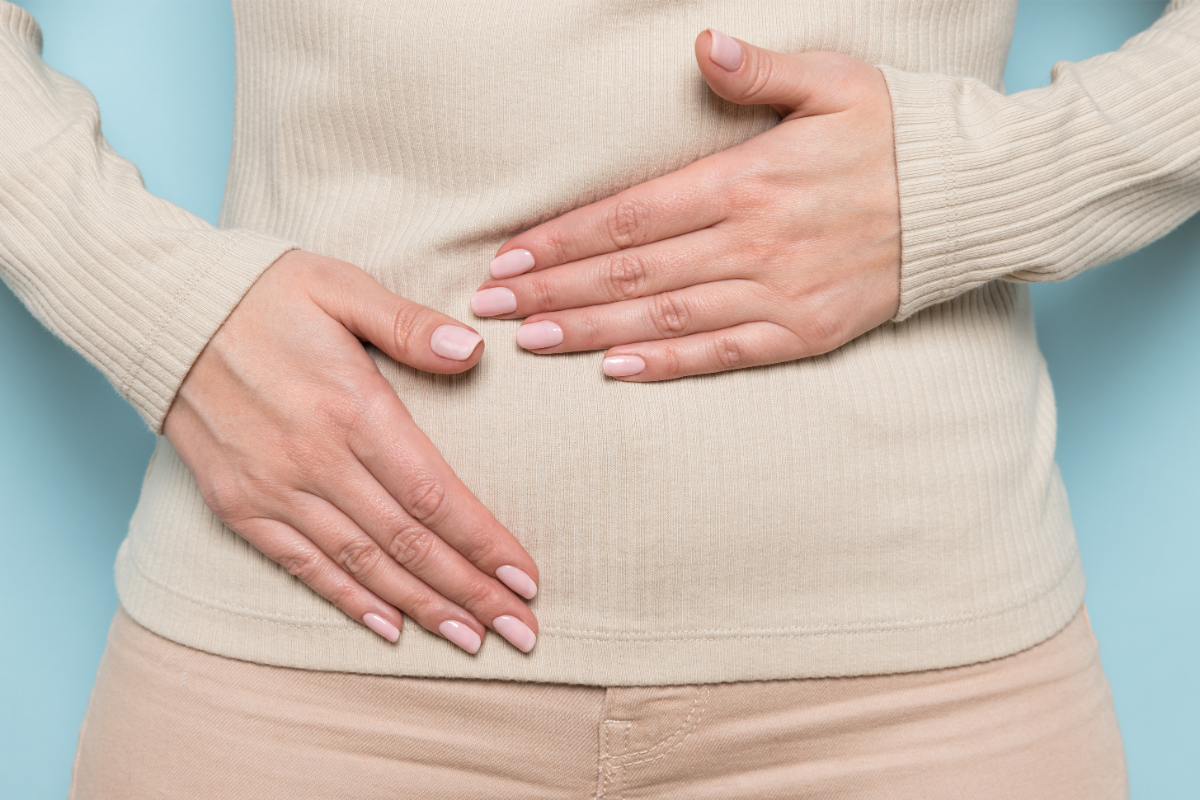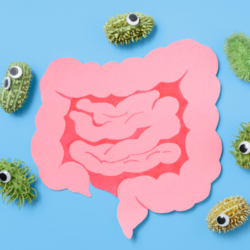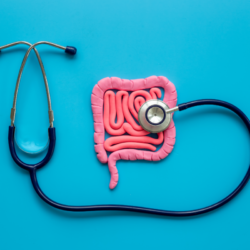Bloating is defined by a feeling of swelling in the abdomen (meteorism) and the need to belch or pass gas. There are several types:
- Bloating of the stomach leads to a feeling of heaviness in the stomach. It is also accompanied by an exaggerated intake of air (aerophagia).
- Bloating of the small intestine therefore occurs in the aftermath of surgery for intestinal obstruction or paralysis. It can also be seen in children with otitis, angina or at the onset of gastroenteritis.
- Bloating of the large colon leads to bloating and abdominal pain. However, it can be caused by intestinal infections, a diet too rich in starchy foods and cabbage, raw vegetables, fruit or carbohydrates.
Definition of bloating
Causes of bloating
Our intestines are colonised by bacteria that play an essential role in digestion. When these germs break down certain foods, they produce gas. It is the excess gas that ultimately causes bloating; the stomach is swollen and pain appears.
How can I avoid bloating?
Bloating is the result of excess fibre intake from eating fruit and raw vegetables, but it’s also usually the result of poor eating habits.
- Avoid drinking fizzy drinks with meals, as they contain digestive inhibitors such as preservatives, tannins, alcohol and refined sugars.
- Avoid industrial preparations rich in fats and additives.
- Give priority to proteins in your diet.
- Avoid foods that cause bloating: white beans, celery, carrots, cabbage, raisins, bananas, apple juice, excess raw vegetables, hot fresh bread, cucumber, mangoes. Limit fast sugars and fats, eggs and ice cream.
- Add thyme, savory, tarragon or chervil to the cooking water if you are cooking dried vegetables
- Choose pasta, rice, potatoes, aubergines, apples, bread, broccoli, poultry, fish, melon, red fruit and still water.
- Choose olive oil, which is the most easily digestible of fats, and herbs, which prevent bloating
- Add organic oat bran to your diet
Life rules
Avoid heavy, fatty and spicy meals, and eat a varied diet
- Eat meals at regular times
- Eat sitting down, slowly and calmly, taking the time to chew your food thoroughly. Stress slows down digestion.
- Avoid chewing gum, soft sweets and stimulants (tobacco, alcohol)
- Avoid stressful situations
- Take some exercise
- Avoid lying down after meals and wearing clothes that are too tight around the abdomen
- Beware of certain medicines that can increase bloating, such as osmotic laxatives.
How to treat bloating
Musculotropic antispasmodics
Trimebutine (Débridat®), Phloroglucineol (Spasfon®), Pinaverium bromide (Dicetel®), Mebeverine (Duspatalin®), Alverine citrate (Météospasmyl®)…
Anticholinergic antispasmodics
Combined with sedatives or anxiolytics: Clidinium bromide 2.5 mg Chlordiazepoxide 5 mg (Librax®)
Absorbent products
They act locally by absorbing intestinal gas emissions:
- simethicone-based products (Benegast® REDUGAS, DULCOGAS®, Polysilane Delalande®, Polysilane Upsa®, Siligaz®) act by modifying the surface tension of gas bubbles, causing them to coalesce (anti-foaming property). They absorb water and gases and bind microbial toxins.
- Vegetable carbon is the benchmark absorbent molecule (Charbon Belloc®, Carbolevure®, Carbactive®, Carbophos®, Elusanes®, Formocarbine®, etc.)
- Speciality containing both simethicone and charcoal: Notgaz®
Precautions for use: absorbent products may reduce the digestive resorption of other medicines. Nevertheless, it is best to respect a 2-hour interval between oral doses.
Gastrointestinal dressings
Clay-based dressings protect the mucosa through their covering power and absorb gas: Bedelix®, Actapulgite®, Smecta®,Smectalia®...
Associated treatment
-
If heartburn accompanies bloating, a combination of an antacid and an absorbent molecule is preferable: Maalox® Bloating, Rennie® Deflatine
Bloating and oligotherapy
To prevent recurrence:
Oligosol® Nickel-Cobalt 1 phial each morning.
Bloating and phytotherapy
Absorbent food supplement
- Vegetable charcoal (Carbactive®, Carbodigest, Elusanes® Charbon, 3 Chênes Carboline...)
Activated vegetable carbon, obtained by carbonising coconut shells, becomes very porous and therefore has a high absorption capacity. Perfectly tolerated, it remains in the digestive tract after ingestion. Ultimately, it will be able to fix locally not only the gases produced by the fermentation of certain foods, but also the bacteria that produce these gases.
It should be taken at a distance from meals and other medicines (1 hour before or 2 hours after) due to the absorbent activity of charcoal (risk of inactivating medicines).
- Clay (Stomargil®…): Best taken at the end of a meal
Carminative and digestive plants
- Green anise (Pimpinella anisum) seeds (fruits) Dosage for adults: Infuse for 15 mins 10g/l; drink 250 to 500ml a day. Warning: do not use if allergic to anethole.
- Fennel (Foeniculum vulgare) fruit: stimulates gastric peristalsis and helps expel gas. Adult dosage: infuse for 15 minutes at 10g/l; drink 250 to 500ml a day. Elusanes® Fennel, Fennel Arkogélules® 1 capsule morning, noon and evening after meals, to be taken with a large glass of water. Warning: do not use if you are allergic to anethole.
- Star an ise (Illicium verum). The dried fruit of the Chinese star anise is known for its virtues in cases of digestive problems such as cramps, bloating and flatulence. Example of use: Decoction of 3 stars per bowl of decoction, once or twice a day at the end of a meal
- Dill. Dill has long been used as a natural remedy for digestive problems such as bloating, cramps and stomach upsets. Its soothing action on the digestive system makes it a valuable ally in promoting healthy digestion.
- Yarrow: Achillea millefolium is traditionally used to help relieve a variety of gastrointestinal disorders, including bloating. Yarrow is a plant rich in various bioactive compounds, including flavonoids, phenolic acids, terpenes and sesquiterpenes. These compounds are known for their anti-inflammatory, antispasmodic and carminative properties. Yarrow’s carminative properties are particularly useful for relieving bloating, as they help to eliminate intestinal gas.
Antispasmodic medicinal plants
- Thyme (Thymus vulgaris) Thym Arkogélules®: 1 capsule with 3 meals.
Formulas to combat bloating
Drinkable solution to reduce bloating
- Fennel fluid extract (fruit) 50ml
-
Gentianfluid extract (roots) 40ml
Take one teaspoon of the mixture diluted in a glass of water morning and evening
Ready-to-use herbal teas
Herbal teas made from a blend of plants to combat bloating. Take after each meal:
- Arkobio® Digestion herbal tea
Bloating and homeopathy
The choice of homeopathic treatment ultimately depends on the location of the bloating
Predominantly in the stomach
- Bloating, belching and stomach pains occurring 1/4 hour after a meal, with a sensation of fullness and short postprandial drowsiness: Nux vomica 5CH: 3 granules to be sucked after meals.
- Carbo vegetabilis 5CH if the bloating is relieved by air expulsion. The presence of even the slightest food causes gas to form, starting in the morning. Subumbilical bloating with pain. The condition is aggravated by alcohol consumption, which causes purplish congestion of the face and difficulty in breathing. Combine with Antimonium crudum if the person tends to eat too quickly.
- Argentum nitricum 9CH: Bloating with stomach pains and very noisy belching which relieves. The condition is aggravated by sweets. Very anxious person.
- Asa foetida 5CH: Swelling and spasms of the stomach and oesophagus with fetid eructations. A burning sensation in the stomach rises to the throat. The disorders are triggered by nervousness.
- Kalium carb swelling above the navel, as soon as or during meals
Predominantly in the lower abdomen
- Lycopodium 5CH: swelling of the lower part of the abdomen (belt-tightening syndrome: improvement of pain by loosening the belt). Acid eructations which do not relieve and emission of gas which relieves. Long postprandial sleepiness and sweet tooth. Fills up quickly despite feeling very hungry at the start of the meal. Aggravation towards 5 p.m.
- Raphanus 5CH Severe meteorism with a lot of gas that cannot be evacuated
- Numerous flatulences: Aurum metallicum 5 CH in a powerful, muscular, congested subject with a purplish face, blotchy skin, very angry with violent words.
What natural treatments are ready to use?
Massage
The essential oils in this massage oil have tonic and stimulating properties for the digestive system. They are also carminative and antispasmodic, and help regulate bowel movements to combat colic and bloating. In short, they facilitate transit and soothe the pain associated with menstrual cycles.
Apply in clockwise circular movements around the navel.
Aroma Express Capsules® Digestion Transit contains :
- Organic Ceylon cinnamon essential oil, renowned for its digestive properties and for fighting digestive infections.
- Lemon essence and peppermint essential oil, known for stimulating the activity of the stomach, liver, gall bladder and pancreas
- Ginger essential oil, renowned for helping to stimulate digestion
USE COUNCIL
- Occasional use: 2 capsules 3 times a day with meals for 5 days.
- Regular use: 1 capsule morning and evening with a meal, 5 days a week throughout the risk period.
Swallow with a glass of cool water.
Bloating and nutritherapy
Probiotics
Take action on bloating for 2 months:
Certain strains of probiotics, including lactobacillus plantarum 299V, help to relieve intestinal discomfort: discomfort, heaviness, bloating, by helping to rebalance a flora disturbed by an unbalanced diet or by antibiotic treatment.
These probiotics are combined with simethicone or smectite with a sheet structure (twice the absorbency of green clay), and peppermint extracts
- Bion® Transit, Bloxair, Ergyphilus® confort, Lactibiane® Référence, Laxeov® Régul-Transit, Oligocaps® ventre plat,Noreslim® Ventre plat, Probiolog® …
Prebiotics
FOS (fructo oligo saccharide), a prebiotic that reduces the production of gas and therefore bloating, and fibre (tamarind, prunes and pectins). Transiline Lero®
Inulin is a prebiotic that restores healthy intestinal flora to reduce the formation of new gas: Benegast® REDUGAS
Combination of plants
- Angelica is particularly useful in cases of bloating
- Chicory stimulates digestion
- Mallow has interesting properties for intestinal transit
- Fumitory is traditionally used to help the body eliminate waste
- Artichoke helps to improve digestive comfort.
Take one phial a day as a 20-day course of treatment. Several courses per year are recommended
- Arkogélules® Artichoke ARKOFLUIDES® Artichoke Fennel Organic, Hépanéphrol®…
Pharmacy advice
Consult a doctor when :
- bloating appears unexpectedly but regularly, lasts abnormally long despite a correct diet, or is very painful.
- in the event of anaemia, weight loss, rectal discharge, steatorrhea or fever.





